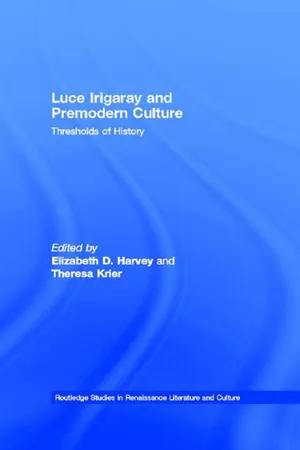
Luce Irigaray and Premodern Culture
Thresholds of History
- 12 pages
- English
- ePUB (mobile friendly)
- Available on iOS & Android
About This Book
The essays in this groundbreaking collection stage conversations between the thought of the controversial feminist philosopher, linguist and psychoanalyst Luce Irigaray and premodern writers, ranging from Empedocles and Homer, to Shakespeare, Spenser and Donne. They explore both the pre-Enlightenment roots of Luce Irigaray's thought, and the impact that her writings have had on our understanding of ancient, medieval and Renaissance culture.
Luce Irigaray has been a major figure in Anglo-American literary theory, philosophy and gender studies ever since her germinal works, Speculum of the Other Woman and This Sex Which Is Not One, were published in English translation in 1985. This collection is the first sustained examination of Irigaray's crucial relationship to premodern discourses underpinning Western culture, and of the transformative effect she has had on scholars working in pre-Enlightenment periods. Like Irigaray herself, the essays work at the intersections of gender, theory, historicism and language.
This collection offers powerful ways of understanding premodern texts through Irigaray's theories that allow us to imagine our past and present relationship to economics, science, psychoanalysis, gender, ethics and social communities in new ways.
Frequently asked questions
Information
Table of contents
- Front Cover
- Half Title
- Routledge studies in Renaissance literature and culture
- Title Page
- Copyright
- Contents
- List of illustrations
- Notes on contributors
- Acknowledgments
- 1 Future anteriors: Luce Irigaray’s transmutations of the past
- 2 Mère marine: narrative and natality in Homer and Virgil
- 3 What does Matter want? Irigaray, Plotinus, and the human condition
- 4 Coming into the word: Desdemona’s story
- 5 “Mutuall elements”: Irigaray’s Donne
- 6 Spenser’s coastal unconscious
- 7 “That glorious slit”: Irigaray and the medieval devotion to Christ’s side wound
- 8 Early modern blazons and the rhetoric of wonder: turning towards an ethics of sexual difference
- 9 Gynephobia and culture change: an Irigarayan just-so story
- 10 The commodities dance: exchange and escape in Irigaray’s “Quand nos lèvres se parlent” and Catherine Des Roches’s “Dialogue d’Iris et Pasithée”
- 11 Afterword
- Bibliography
- Works by Luce Irigaray
- Index